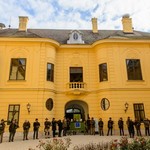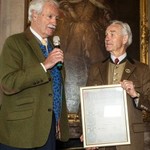
12-11-2015 - CIC President of Honor, Dieter Schramm, awarded the title of President of Honor of ÖFB 12 November 2015
The Austrian Falconry Federation (Österreichischer Falknerbund, ÖFB), together with the University of Natural Resources and Life Sciences (Universität für Bodenkultur, BOKU), organised a special event on falconry as intangible cultural heritage at the end of October.
The audience was welcomed by Ing. Gottfried Klinghofer (Chief Professional Hunter of Mistelbach), Dr. Philipp Harmer (Head of the CIC Austrian Delegation) and Univ.-Prof. Dr. Klaus Hackländer (Head of the Institute of Wildlife Biology and Game Management of BOKU and Deputy President of the CIC Applied Science Division). The keynote speeches of Univ.-Doz. DDr. Sigrid Schwenk (hunting scientist) on “Falconry – several thousand year old hunting cultural asset” and DI Paul Weiß about “The hunting in Marchfeld – the future of small game“ were very much appreciated.

The ÖFB-President, Dr. Harald Barsch, was pleased to award Dipl.-Ing. Dieter Schramm, CIC President of Honor, the title of “President of Honor of the Austrian Falconry Federation”. Dr. Barsch explained that this award was given to Mr. Schramm in view of his extraordinary contributions to the recognition of falconry as an intangible cultural heritage by UNESCO. Mr. Schramm, in his acceptance remarks, pointed to three tasks which he feels obliged to further assist in (1) better acceptance of falconry within the international and national hunting community; (2) better coordination of the falconry community amongst themselves; and (3) wider acknowledgement of falconry as cultural heritage within the general public. He pointed out that the general acceptance of this exceptional, traditional method of sustainable hunting will provide an invaluable service to the acceptance of hunting in general.
The event was closed by a Czech horn quartet. The music accompanied participants into the hunting grounds. Some participants hadn’t seen any hunting with birds of prey before and highly appreciated this fair hunting method.
In his closing words, Univ.-Prof. Dr. Klaus Hackländer, underlining the statement of Mr. Schramm, pointed out that “Falconry definitely has a certain attraction to the public. In such difficult times in which hunters have to think about their position within society, falconry, as a several thousand year old tradition, allows the opportunity to improve the image of hunting in the public eye. The recognition of falconry as intangible cultural heritage has started to pave the path to a future where hunting is once again embraced by society.”



